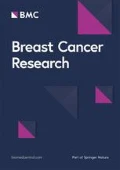Background
Post-translational modification of histones is a common mode of regulating chromatin structure and gene activity in normal tissues. In malignant cells, aberrant modifications through acetylation and methylation at the promoter regions of individual histones have been reported. Global changes in histone modification have recently been shown to be predictive of clinical outcome in prostate cancer. However, the expression and prognostic significance of modified histones in breast cancer has not been previously explored.
Methods
Global histone modification in a large well-characterised series of breast carcinomas (n = 880) with long-term follow-up was therefore assessed using immunohistochemistry and tissue microarray. Specific antibodies were used to detect acetylation of H3 (Lys9 and Lys18) and H4 (Lys12), and dimethylation of histone H4 (Arg3) and H3 (Lys4). The presence of these chromatin 'marks' was correlated with clinicopathological variables and patients' outcome.
Results
Reduced levels of histone acetylation/dimethylation were observed in medullary-like carcinomas, whereas they were readily detected in lobular and tubular carcinomas. Reduced global histone acetylation/dimethylation was significantly associated with established poor prognostic variables; larger tumour size, higher stage, recurrence, distant metastases and higher mortality rate. Survival analyses showed low detection of the histone modifications, with the exception of acetylated H3K9, was associated with shorter overall survival and shorter disease-free interval.
Conclusion
Our results show, for the first time, that global changes in specific histone modification patterns may play an important role in breast cancer development and progression and their reduced expression is associated with poor prognosis and shorter survival.
Author information
Authors and Affiliations
Rights and permissions
About this article
Cite this article
Green, A., El-Shiekh, S., Rakha, E. et al. Global histone modifications in breast cancer and their prognostic significance. Breast Cancer Res 8 (Suppl 2), P33 (2006). https://doi.org/10.1186/bcr1588
Published:
DOI: https://doi.org/10.1186/bcr1588

